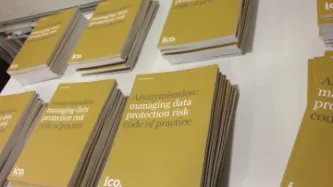Search
Content type: News & Analysis
A full analysis of the UK Information Commissioner's "Anonymisation code of practice: managing data protection risk" will take time and working knowledge of how the code is used in practice.
At the launch, the ICO signalled that while they believed the code was now up to scratch, they were open to additions and clarifications given that it is the first document of its kind in the world. We applaud them for this; the code is likely to be copied internationally, so it is particularly…
Content type: News & Analysis
Twelve years after the Regulation of Investigatory Powers Act (RIPA) was passed by the UK Parliament, permitting the interception of communications without a judicial warrant and allowing the police to self-authorise access to communications metadata, some parts of this dangerous law are finally being properly scrutinised. This isn't an intentional review, but rather a by-product of a joint parliamentary committee's interrogation of the draft Communications Data Bill, the Home Office's…
Content type: News & Analysis
Privacy International is proud to announce our new project, Eyes Wide Open, which aims to pry open the Five Eyes arrangement and bring it under the rule of law. Read our Special Report "Eyes Wide Open" and learn more about the project below.
For almost 70 years, a secret post-war alliance of five English-speaking countries has been building a global surveillance infrastructure to “master the internet” and spy on the worlds communications. This arrangement binds together the US, UK, Canada,…
Content type: News & Analysis
The Home Office has been planning a grab for new communications surveillance powers since 2006; today, the Draft Communications Data Bill established in legislative language their ambitions.
Yes, as they will point out, it isn't their the full scope of their ambitions. In 2008, under Labour, they proposed the idea of a vast centralised database of the nation's communications data. In 2009 they abandoned the idea of a central database. Since then, a new government has been elected,…
Content type: Press release
The government today published a draft version of a bill that, if signed into law in its current form, would force Internet Service Providers (ISPs) and mobile phone network providers in Britain to install 'black boxes' in order to collect and store information on everyone's internet and phone activity, and give the police the ability to self-authorise access to this information. However, the Home Office failed to explain whether or not companies like Facebook, Google and Twitter will be…
Content type: News & Analysis
On Thursday 19th April, Privacy International - in partnership with the LSE, the Foundation for Information Policy Research, Open Rights Group and Big Brother Watch - hosted Scrambling for Safety 2012, a discussion of the Home Office's new plans for mass interception in the UK. Around 200 people turned up (despite the sporadic but torrential rain!), and the number of insightful, well-informed questions from the audience proved to us that the Home Office is not going to…
Content type: News & Analysis
In September last year, David Cameron told the UN general assembly: "As people in north Africa and the Middle East stand up and give voice to their hopes for more open and democratic societies, we have an opportunity – and I would say a responsibility – to help them." The Arab Spring uprisings had provided a chink of light for those living under repressive regimes, and it was now up to western democracies to help them throw open the door to a bright new future.
Yet over the past six…
Content type: Press release
An internal Liberal Democrat briefing on Home Office plans to massively expand government surveillance was today passed to Privacy International. The document contains significant evasions and distortions about the proposed 'Communications Capabilities Development Programme' (CCDP), and is clearly intended to persuade unconvinced Lib Dem MPs to vote in favour of the proposal.
The document contains a section entitled 'Remember, under Labour' consisting of a list of the previous government's…





